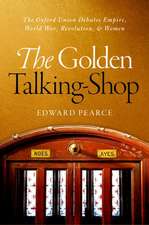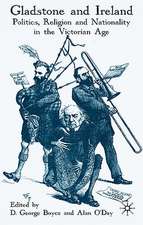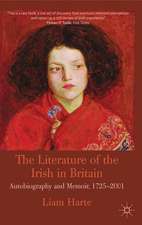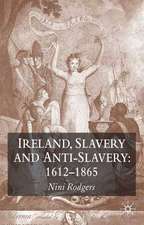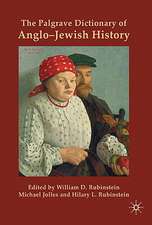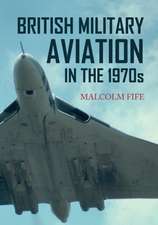Imperial Endgame
Autor B. Grob-Fitzgibbonen Limba Engleză Paperback – 3 mai 2011
Preț: 232.11 lei
Puncte Express: 348
Preț estimativ în valută:
41.02€ • 48.26$ • 35.81£
41.02€ • 48.26$ • 35.81£
Carte tipărită la comandă
Livrare economică 06-20 aprilie
Specificații
ISBN-13: 9780230248731
ISBN-10: 023024873X
Pagini: 478
Ilustrații: XV, 478 p.
Dimensiuni: 130 x 196 x 30 mm
Greutate: 0.54 kg
Ediția:2011 edition
Editura: Palgrave Macmillan UK
Locul publicării:London, United Kingdom
ISBN-10: 023024873X
Pagini: 478
Ilustrații: XV, 478 p.
Dimensiuni: 130 x 196 x 30 mm
Greutate: 0.54 kg
Ediția:2011 edition
Editura: Palgrave Macmillan UK
Locul publicării:London, United Kingdom
Cuprins
Acknowledgments Maps Prologue PART I: THE ATTLEE YEARS, JULY 27, 1945 - OCTOBER 26, 1951 A Promised Land, but to Whom? The American Intervention The Terror Begins Again The End of Compromise Into the Abyss The Endgame in Palestine Trouble Comes to Malaya The Appointment of Sir Harold Briggs The Special Air Service, the Briggs Plan, and Progress in Malaya The End of the Attlee Years PART II: THE CHURCHILL YEARS, OCTOBER 26, 1951 - APRIL 6, 1955 A New Government, a New Approach The Carrot and the Stick The Challenge of Mau Mau The General's Stamp in Malaya 'The Horned Shadow of the Devil Himself' Dirty Wars, Dirty Deeds A Fresh Start in Kenya? The End of the Churchill Years PART III: THE EDEN YEARS, APRIL 7, 1955 - JANUARY 10, 1957 Problems in Paradise Templer's Return The Dirty Wars become Dirtier Suez The Endgame for Anthony Eden Epilogue: The Imperial Endgame after Eden Notes Bibliography Index
Recenzii
'Grob-Fitzgibbon challenges the popular view that Britain shed its empire politely, like a tea party at the vicarage in an Agatha Christie mystery. He makes it clear that the reality was very different. Withdrawal from empire was difficult, dangerous and dirty and the politicians, diplomats, soldiers and policemen who brought empire to an end did so in a way not brought out as powerfully and persuasively before. For anyone worried about how things might end in Iraq or Afghanistan, Grob-Fitzgibbon's excellent, dispassionate, forensic analysis will make uncomfortable but illuminating reading.'
- Colonel Alex Alderson, MBE, Director of the United Kingdom Counterinsurgency Centre
'Imperial Endgame is a controversial and important book. Benjamin Grob-Fitzgibbon has no time for conventional pieties. Junking the tired story of disarray and humiliation, he shows how Britain ruthlessly disposed of the Empire on its own unsentimental terms. This strategy often involved dirty tactics and dirty wars but the objective was clear: to keep newly-independent states within Britain's sphere of influence.It's abold re-telling of the decolonisation story, pulledoff with great style and panache.'
- Richard Aldous, author of The Lion and the Unicorn, and Eugene Meyer Professor of British History and Literature at Bard College, New York, USA
'The end of the British Empire was characterized not only by relatively smooth transitions to independence but also by the winning of independence by violent means of insurgency. Imperial Endgame is an excellent history of the British counter-insurgency campaigns marking the end of colonial rule, above all in Palestine, Malaya, Kenya, Cyprus, and Aden. '
- Wm. Roger Louis, University of Texas at Austin, USA
'Comprehensive and well-handled study' - English Historical Review
'...a very good, detailed account from a high politics and strategy viewpoint...One of the most valuable aspects of this book is its retailing of the atrocious methods Britain often resorted to in order to attempt to keep 'order' in the face of all these postwar challenges to its colonial rule.' - Bernard Porter, History Today
'The work is very accessible, combining diplomatic history (much of it ased on primary documents) with accounts of how the situation on the ground often caught the 'imperial masters' off-guard.' - Roger Mac Ginty, University of Manchester, The Round Table
'This is a very welcome study of an important, and topical, dimension to the last phase of British colonial rule...In recounting the methods employed by Britain to maintain 'order', the author presents a much-needed counterweight to the elegantly phrased, and intentionally reassuring opinions so often encountered in the recorded views of contemporary policy-makers. That he does this by considering so diverse a range of case studies only serves to make his account more compelling. In short, this book offers a timely and valuable corrective to any lingering historiographical complacency on British disengagement from empire. As such, it promises to enrich discussion of a central theme in contemporary British (and world) history, and deserves to have a wide readership.
- Larry Butler, H-Soz-u-Kult, H-Net Reviews. October, 2013
- Colonel Alex Alderson, MBE, Director of the United Kingdom Counterinsurgency Centre
'Imperial Endgame is a controversial and important book. Benjamin Grob-Fitzgibbon has no time for conventional pieties. Junking the tired story of disarray and humiliation, he shows how Britain ruthlessly disposed of the Empire on its own unsentimental terms. This strategy often involved dirty tactics and dirty wars but the objective was clear: to keep newly-independent states within Britain's sphere of influence.It's abold re-telling of the decolonisation story, pulledoff with great style and panache.'
- Richard Aldous, author of The Lion and the Unicorn, and Eugene Meyer Professor of British History and Literature at Bard College, New York, USA
'The end of the British Empire was characterized not only by relatively smooth transitions to independence but also by the winning of independence by violent means of insurgency. Imperial Endgame is an excellent history of the British counter-insurgency campaigns marking the end of colonial rule, above all in Palestine, Malaya, Kenya, Cyprus, and Aden. '
- Wm. Roger Louis, University of Texas at Austin, USA
'Comprehensive and well-handled study' - English Historical Review
'...a very good, detailed account from a high politics and strategy viewpoint...One of the most valuable aspects of this book is its retailing of the atrocious methods Britain often resorted to in order to attempt to keep 'order' in the face of all these postwar challenges to its colonial rule.' - Bernard Porter, History Today
'The work is very accessible, combining diplomatic history (much of it ased on primary documents) with accounts of how the situation on the ground often caught the 'imperial masters' off-guard.' - Roger Mac Ginty, University of Manchester, The Round Table
'This is a very welcome study of an important, and topical, dimension to the last phase of British colonial rule...In recounting the methods employed by Britain to maintain 'order', the author presents a much-needed counterweight to the elegantly phrased, and intentionally reassuring opinions so often encountered in the recorded views of contemporary policy-makers. That he does this by considering so diverse a range of case studies only serves to make his account more compelling. In short, this book offers a timely and valuable corrective to any lingering historiographical complacency on British disengagement from empire. As such, it promises to enrich discussion of a central theme in contemporary British (and world) history, and deserves to have a wide readership.
- Larry Butler, H-Soz-u-Kult, H-Net Reviews. October, 2013
Notă biografică
BENJAMIN GROB-FITZGIBBON is Assistant Professor of History, Cleveland C. Burton Professor of International Programs, and Associate Director of the International Relations Program at the University of Arkansas, USA. Born in the north of England in 1979, he received his doctorate from Duke University in 2006. His first book, The Irish Experience during the Second World War, was published in 2004. His second book, Turning Points of the Irish Revolution, in 2007. He has previously taught at Duke University and North Carolina State University.

